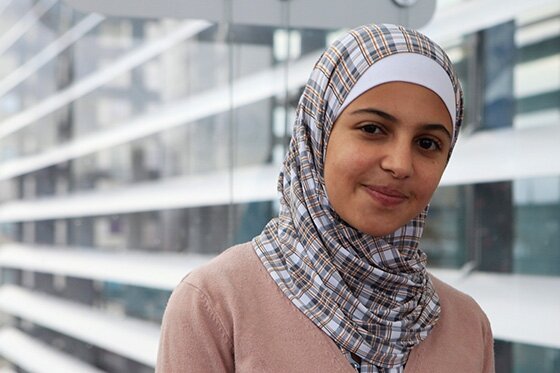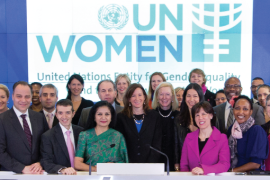Imagine a world where the sound of books flipping in a classroom is replaced by the echoes of war. Where dreams of becoming a doctor, teacher, or scientist are shattered by the brutal realities of displacement. This was Muzoon Almellehan’s reality—but rather than giving in to despair, she decided to fight for change.
Muzoon, a Syrian refugee and global education activist, is proof that courage and determination can break even the most formidable barriers. At just 16, she became a beacon of hope for millions of displaced children, showing them that education is the bridge to a brighter future—even amidst the darkness of conflict.
The Girl with a Backpack Full of Books
When Muzoon fled Syria with her family in 2013, she carried with her something more valuable than belongings—her schoolbooks. For Muzoon, education was not just a priority; it was her lifeline.
“I knew that leaving everything behind didn’t mean I had to leave my dreams behind too. My books reminded me of who I was and who I could still become,” she says.
Her new home in Jordan’s Za’atari refugee camp was a stark contrast to the bustling life she’d known. Yet, as others focused on survival, Muzoon became a one-girl army, walking from tent to tent, urging families to send their children to school. Her resolve earned her the nickname “the Malala of Syria”, a tribute to her fellow education activist and Nobel laureate, Malala Yousafzai.
Breaking Cultural Barriers
In many refugee communities, education for girls is often seen as an afterthought or worse, a luxury. Early marriage and child labor loom large as grim alternatives. Muzoon’s mission was to challenge these cultural norms head-on.
With unrelenting determination, she spoke to mothers, fathers, and community elders, armed with her simple yet powerful message:
“Education is not just for today; it’s for the future of our families, our daughters, and our nations.”
Girls in crisis zones are 2.5 times more likely to be out of school than boys, according to UNESCO.
Through her efforts, Muzoon inspired countless families to reimagine the role of education in rebuilding lives.
A Global Voice for the Voiceless
Muzoon’s passion didn’t go unnoticed. By the age of 16, her advocacy had taken her far beyond the refugee camp. She addressed world leaders at the UN General Assembly, sharing her own story to shine a light on the millions of children deprived of an education.
In 2017, she made history as the youngest UNICEF Goodwill Ambassador and the first with a refugee background. Her work has taken her across continents, from refugee camps in Chad to international summits in Europe, as she continues to amplify the voices of displaced children. “Education isn’t just a right, it’s hope. It’s what keeps us alive when everything else is taken from us,” she says.
Why Education in Emergencies Matters
The statistics are staggering. Around 222 million children worldwide are affected by emergencies and crises, with millions forced out of school. For girls, the stakes are even higher, as education is often their only defense against early marriage, exploitation, and poverty. Every additional year of schooling can increase a girl’s future earnings by up to 20%.
For Muzoon, these numbers aren’t just abstract, they represent real lives and futures on the brink of being lost.
Ripple Effects of a Young Advocate
The impact of Muzoon’s work is felt across the globe. Take the story of Amira Sululhu, a 14-year-old Syrian girl in a refugee camp who had abandoned her education after losing her home. After meeting Muzoon and hearing her passionate plea, Amira re-enrolled in school and now dreams of becoming a nurse. “Muzoon made me believe that my education is my strength, no matter where I come from,” says Amira.
These stories illustrate the transformative power of Muzoon’s message and her belief that education is the key to breaking cycles of poverty and displacement.
An Icon of Hope for Refugees Everywhere
Muzoon isn’t just a leader—she’s a symbol of what’s possible when resilience meets opportunity. Her story resonates with women everywhere, reminding us that adversity can fuel extraordinary achievements.
Her accolades speak volumes:
- Named one of TIME’s 100 Most Influential People in 2017, recipient of the Hillary Rodham Clinton Award for Advancing Women in Peace and Security and she was a celebrated speaker at global events like the World Economic Forum.
And yet, Muzoon remains deeply grounded, driven not by fame but by her unshakable belief in the power of education.
Lessons from Muzoon
For women balancing careers, families, and dreams, Muzoon’s journey offers a powerful lesson: start where you are, with what you have. Whether it’s advocating for a cause, mentoring someone, or investing in self-improvement, small actions can spark monumental change.
Her advice to young women is simple yet profound: “Don’t let anyone tell you your voice doesn’t matter. Every time you speak up, you plant a seed of change that can grow into something extraordinary.”
Why Muzoon Inspires Us All
Muzoon’s life is a testament to the indomitable spirit of women. She took the devastation of war and transformed it into a mission to rebuild lives, proving that education is the ultimate weapon against adversity.
This week, as we honor Muzoon Almellehan, let her journey remind us of our own strength and capacity to create change. Her story is more than a tale of survival, it’s a rallying cry for all of us to dream bigger, fight harder, and believe in the transformative power of knowledge.
Because if a refugee with nothing but her books can change the world, so can you.





Comments are closed.